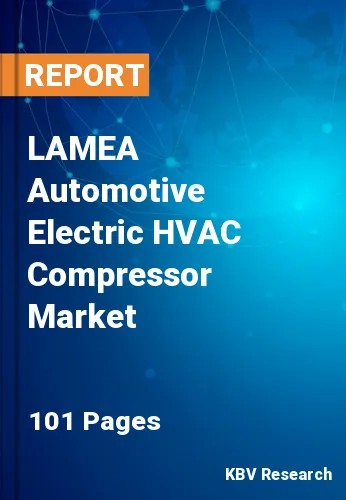
The Latin America, Middle East and Africa Automotive Electric HVAC Compressor Market would witness market growth of 20.6% CAGR during the forecast period (2021-2027).
An electric compressor obtains power from an independent motor, which draws power from an inverter. Such procedure makes certain that there is a continuation of the cooling operation of the vehicle even when the vehicle is switched off. The electric compressor also needs a low amount of power to drive due to this arrangement, hence least affecting the vehicle performance and facilitating the cleaner operations because of the low oil carryover.
There are many advantages provided by an electric compressor as compared to the traditional compressor. Advantages like controlled revolution speed, lower consumption of energy, compact size, and noise-free operations make electric compressors highly popular across the automotive industry. In addition to it, an electric compressor is separated from the engine of the vehicle which is quite different from a traditional compressor that is belt-driven.
Electric vehicles have been launched in the market so as to manage the problem of vehicle emission. For electric vehicles, an electric AC compressor is utilized. An electric AC compressor is installed in high-end vehicles. The growing standard of living and buying power of the customers has boosted the demand for premium vehicles. Moreover, demand for zero-emission vehicles is boosting with an aim to address the issue of a deteriorating environment. In addition, the growing trend of electrification of vehicles would boost the electric segment of the regional market. These aspects are likely to accelerate the regional automotive electric HVAC compressor market during the forecast period.
The Passenger Vehicle market dominated the Brazil Automotive Electric HVAC Compressor Market by Vehicle Type 2020, and would continue to be a dominant market till 2027; thereby, achieving a market value of $153.2 million by 2027. The Light Commercial Vehicle (LCV) market is estimated to witness a CAGR of 18.6% during (2021 - 2027). Additionally, The Heavy Commercial Vehicle (HCV) market is expected to witness a CAGR of 19.9% during (2021 - 2027).
Based on Vehicle Type, the market is segmented into Passenger Vehicle, Light Commercial Vehicle (LCV), Heavy Commercial Vehicle (HCV) and Others. Based on Drivetrain, the market is segmented into Hybrid Electric Vehicles (HEV), Plug-in Hybrid Electric Vehicles (PHEV) and Battery Electric Vehicles (BEV). Based on Cooling Capacity, the market is segmented into 20-40 CC, Less Than 20 CC, 40-60 CC and Others. Based on countries, the market is segmented into Brazil, Argentina, UAE, Saudi Arabia, South Africa, Nigeria, and Rest of LAMEA.
Free Valuable Insights: The Global Automotive Electric HVAC Compressor Market is Predict to reach $30.4 Billion by 2027, at a CAGR of 19.4%
The market research report covers the analysis of key stake holders of the market. Key companies profiled in the report include Denso Corporation, Toyota Industries Corporation, Valeo SA, Aptiv PLC, Panasonic Corporation, Brose Fahrzeugteile SE & Co. KG, BorgWarner, Inc., Hanon Systems (Hahn & Co. Auto Holdings Co., Ltd.), Mahle GmbH (Mahle Stiftung GmbH), and Sanden Holdings Corporation.
By Vehicle Type
By Drivetrain
By Cooling Capacity
By Country
Our team of dedicated experts can provide you with attractive expansion opportunities for your business.
